The French government declared a state of emergency in New Caledonia on Wednesday in an effort to quell deadly unrest in France’s semi-autonomous Pacific territory.
French authorities have launched what they called a “massive” mobilization of security forces since violent protests erupted in New Caledonia this week over proposed amendments to the French constitution that would change local voting rules in the region. France’s parliament voted to approve the amendment on Tuesday, sparking riots overnight.
“The priority is to restore order, calm and tranquility,” French Prime Minister Gabriel Attal told lawmakers on Wednesday.
The French government said that more than 1,800 security personnel are already in the country and 500 reinforcements will arrive in the next 24 hours. At the crisis meeting, Attal said the military was being deployed to secure ports and airports.
Some businesses and public buildings, including schools, were looted or set on fire, according to the French High Commission. The High Commission of the Republic of New Caledonia said in a statement that officials said the riots had left three people dead and hundreds injured, including 64 police and gendarmes. statement. It was unclear whether the death toll included the death of a mobile military policeman, who the statement said died on Wednesday.
The statement said that as of Thursday local time, nearly 200 people had been arrested, and the Ministry of Interior had issued five arrest warrants for people suspected of supporting the riots.
The 12-day state of emergency gives authorities more security powers, allowing them to issue traffic bans, place people under house arrest, ban protests and conduct raids without normal judicial oversight.
French President Emmanuel Macron, who held a crisis meeting on Wednesday, expressed “strong emotions” about the deaths and expressed his gratitude to French security forces, his office said in a statement.
“All acts of violence are intolerable and will be met with a ruthless response” to ensure order is restored, the statement said.
Macron postponed a planned Thursday inauguration of Norman’s first new nuclear reactor, a sign that authorities are taking the situation seriously.
In 1853, France annexed New Caledonia, an island with a population of about 270,000. The indigenous Kanak people currently make up about 40% of the population, while Europeans make up about a quarter.
The prospect of independence and long-standing social inequalities have fueled decades of tensions in the region. The territory enjoys rare autonomy from France and has held three independence referendums since 2018; all were rejected.
In the 1980s, after an uprising known as “The Incident” killed dozens of people there, the French government struck a deal with pro-independence activists pledging changes.
Proposed constitutional changes – broadening the eligibility of French citizens to vote in provincial elections – have struck a new nerve. Pro-independence activists in New Caledonia have expressed concern that it would weaken their movement and reflect a more aggressive attempt by the French government to assert itself in the territory.
New Caledonia is France’s key foothold in the Indo-Pacific region, and French officials have warned that an independent New Caledonia, with its vast territorial waters and nickel mines, could soon fall under Chinese control.
New Caledonia’s electoral roll has been effectively frozen since 2007, with only voters listed in 1998 considered eligible to vote in subsequent local elections. Adrian Muckle, a senior lecturer in history at Victoria University of Wellington in New Zealand, said the amendment gave all French citizens who had lived in the territory for 10 years the right to vote, effectively increasing the number of voters by about 20,000 to 25,000 people.
Tensions have grown over the past few weeks, with protests turning violent on Monday night.
To ease pressure, Macron’s government has pledged not to implement constitutional changes before the end of June – which would require a vote in a special session of parliament. It has also invited pro- and anti-independence groups to talks to try to reach a local agreement.
The main pro-independence group, the Socialist National Liberation Front of Kanak (FNKF), condemned the vote on the constitutional amendment in a statement on Wednesday but also called for calm.
The statement said the French government’s offer to organize talks was an “opportunity” to ensure that “everyone’s demands, including those of protesters, are heard and taken into account.”
The French High Commission in New Caledonia said a curfew imposed on the capital Noumea on Tuesday would remain in place and all public gatherings banned. Noumea’s international airport has been closed since Tuesday, all commercial flights have been canceled and local authorities said schools will remain closed until further notice.

